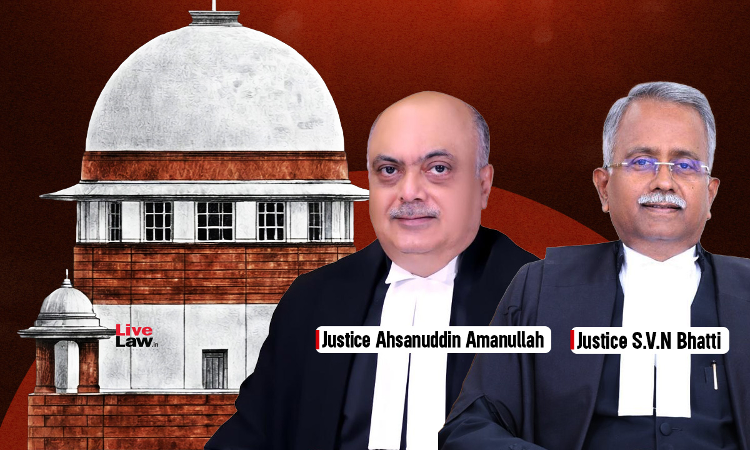- Home
- /
- Supreme court
- /
- For Valid Oral Gift (Hiba) Under...
For Valid Oral Gift (Hiba) Under Mohammedan Law, Public Possession Must Be Proved; Absence Of Mutation Raises Doubt: Supreme Court
Yash Mittal
7 Oct 2025 5:02 PM IST
Hiba cannot operate in secrecy as a surprise instrument, the Court said.
The Supreme Court observed that an oral gift (hiba) under the Muslim law cannot be projected as a "surprise instrument" to stake claims over a property. To constitute a valid hiba, the Court said, all its necessary ingredients- declaration by donor, acceptance by donee and taking possession of land - are done publicly rather than secretly.Although oral gift (hiba) is permissible in...
The Supreme Court observed that an oral gift (hiba) under the Muslim law cannot be projected as a "surprise instrument" to stake claims over a property. To constitute a valid hiba, the Court said, all its necessary ingredients- declaration by donor, acceptance by donee and taking possession of land - are done publicly rather than secretly.
Although oral gift (hiba) is permissible in Mohammedan law, the evidence of acting under the gift - such as collecting rent, holding title, or effecting mutation- is essential to substantiate the claim of possession. Lack of effecting mutation in revenue records can be a crucial factor invalidating such a claim of gift, in the absence of other evidence of possession, the Court said.
It stressed that those claiming rights under a hiba must assert their ownership openly and without delay by mutating land records to reflect possession, an essential requirement for the validity of such a gift.
“The precedents are that to constitute a valid conveyance through an oral gift, the three contemporaneous conditions of declaration by donor, acceptance by donee, possession by donee and to continue to establish possession through contemporaneous evidence to show that Hiba is acted upon. The Hiba is not used as a surprise instrument and cannot sprout into a transfer of property as per the convenience of a party. Moreover, to keep in line with the sanctity of Hiba, it is in the interest of the donor, donee and a third person interested in the subject matter that Hiba is acted upon by completing all three essential requirements in public knowledge rather than in secrecy.”, the court said.
A Bench of Justices Ahsanuddin Amanullah and SVN Bhatti made the observation while overturning the Karnataka High Court's ruling that had recognized the Respondent-plaintiff's rights over 10 acres of land allegedly gifted to her by her mother through an oral gift in 1988, despite the absence of any mutation in land records to substantiate her possession over the gifted property.
The Court explained that there are three essential conditions for an oral gift under Mohammedan Law.
First, a clear manifestation of the wish to give on the part of the donor.
Second, an acceptance of the gift by the donee, which can be either implied or explicit.
Third, taking of possession of the subject-matter of the gift by the donee, either actually or constructively.
In this case, the Court emphasized the third requirement of a valid gift: delivery of possession, either actual or constructive. The judgment authored by Justice Bhatti observed that the Respondent's failure to promptly seek mutation of her name in the revenue records, along with the continued entries in favor of the Appellants and their predecessor (the husband), established their possession over the land, an inference the Respondent-claimant could not disprove.
“the evidence of acting under the gift (e.g., collecting rent, holding title, mutation) is essential to substantiate the claim of possession. While Mohammedan Law allows for a gift to be made orally without a written document, the validity of such a gift is contingent on the demonstration of all three essential elements, particularly the delivery of possession. The courts will scrutinise “contemporaneous” and “continuous” evidence of the donee's actions and control over the property to determine if possession was indeed transferred. The lack of evidence (e.g., failure to collect rent, donor's continued control, lack of mutation) will lead to proving that a gift was never completed, regardless of any written declaration.”, the court said.
“In the case at hand, there is a consistent revenue record, Ex. P-2, Ex. P-3, Ex. P-4, Ex. P-5 and Exs. D-9 to D-43 showing in the revenue records that the names of Defendants are entered in ROR and their predecessors in interest, both in the title and possession columns. The Plaintiff places oral evidence, and the circumstances summed up above do not inspire confidence for accepting that there has been a valid oral gift in any capacity, i.e., as a daughter or otherwise, in favour of Plaintiff. The impugned judgments presume possession in favour of Plaintiff on ipse dixit statements, and the courts below fell in grave error in not appreciating the long lapse of years and continued silence of Plaintiff vis-à-vis the Suit Property.”, the Court added.
Accordingly, the appeal was allowed.
The judgment referred to the recent precedent Mansoor Saheb v. Salima, Rasheeda Khatoon v. Ashiq Ali (2014) 10 SCC 459 etc.
Cause Title: DHARMRAO SHARANAPPA SHABADI AND OTHERS VERSUS SYEDA ARIFA PARVEEN
Citation : 2025 LiveLaw (SC) 973
Click here to read/download the judgment
Appearance:
For Petitioner(s) : Mr. Rauf Rahim, Sr. Adv. Mr. Yash Prashant Sonavane, Adv. Mr. Gopal Bhosale, Adv. Ms. Sangita Bhosale, Adv. Mr. Ali Rauf Rahim, Adv. Mr. Ravindra Keshavrao Adsure, AOR
For Respondent(s) : Mr. Ameet Kr Deshpande, Sr. Adv. Mr. Akshat Shrivastava, AOR Mr. Vibhor Jain, Adv. Mrs. Pooja Shrivastava, Adv.



